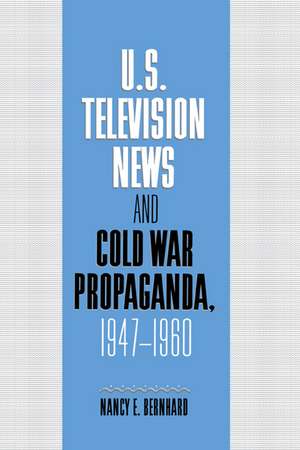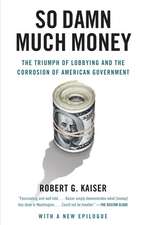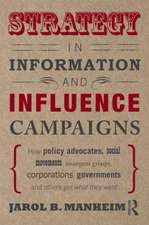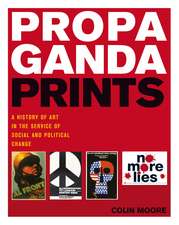U.S. Television News and Cold War Propaganda, 1947–1960: Cambridge Studies in the History of Mass Communication
Autor Nancy Bernharden Limba Engleză Paperback – 15 oct 2003
| Toate formatele și edițiile | Preț | Express |
|---|---|---|
| Paperback (1) | 443.76 lei 6-8 săpt. | |
| Cambridge University Press – 15 oct 2003 | 443.76 lei 6-8 săpt. | |
| Hardback (1) | 691.56 lei 6-8 săpt. | |
| Cambridge University Press – 27 mai 1999 | 691.56 lei 6-8 săpt. |
Din seria Cambridge Studies in the History of Mass Communication
-
 Preț: 270.84 lei
Preț: 270.84 lei -
 Preț: 456.50 lei
Preț: 456.50 lei -
 Preț: 397.45 lei
Preț: 397.45 lei -
 Preț: 405.83 lei
Preț: 405.83 lei -
 Preț: 258.47 lei
Preț: 258.47 lei -
 Preț: 210.25 lei
Preț: 210.25 lei -
 Preț: 278.72 lei
Preț: 278.72 lei - 11%
 Preț: 643.37 lei
Preț: 643.37 lei -
 Preț: 357.29 lei
Preț: 357.29 lei
Preț: 443.76 lei
Preț vechi: 498.61 lei
-11% Nou
Puncte Express: 666
Preț estimativ în valută:
84.91€ • 88.88$ • 70.67£
84.91€ • 88.88$ • 70.67£
Carte tipărită la comandă
Livrare economică 31 martie-14 aprilie
Preluare comenzi: 021 569.72.76
Specificații
ISBN-13: 9780521543248
ISBN-10: 052154324X
Pagini: 268
Ilustrații: 9 b/w illus. 3 tables
Dimensiuni: 152 x 225 x 18 mm
Greutate: 0.4 kg
Editura: Cambridge University Press
Colecția Cambridge University Press
Seria Cambridge Studies in the History of Mass Communication
Locul publicării:New York, United States
ISBN-10: 052154324X
Pagini: 268
Ilustrații: 9 b/w illus. 3 tables
Dimensiuni: 152 x 225 x 18 mm
Greutate: 0.4 kg
Editura: Cambridge University Press
Colecția Cambridge University Press
Seria Cambridge Studies in the History of Mass Communication
Locul publicării:New York, United States
Cuprins
Introduction: selling the Cold War consensus; 1. Business, the state, and information from World War II to Cold War; 2. Democracy and the advent of television news; 3. The State Department's domestic information programs; 4. The television industry at war in Korea; 5. The White House and NBC present battle report - Washington; 6. The Defense Department's domestic information programs; 7. Objectivity and consensus journalism; Conclusion; Selling America: corporate prerogatives and democratic processes.
Recenzii
"The author chooses well-chosen sources to document 'East-West relations steeped in consumer oriented anti-communism,' which helped to form a 'Cold War consensus.'...She shares acute insights on the power of metaphor--as when many characterized television as an X-ray and a mirror--and provides a persuasive concluding chapter, 'Selling America.' A readable book recommended for all collections." Choice
"Overall, U.S. Television News and Cold War Propaganda is clear and concise, making it accessible to a wide range of audiences." Tom Liacas, Canadian Journal of Communication
"This excellent book...expertly covers the interacctions of the U.S. government with developing television network news organizations in the coverage of the early years of the Clod War...this book is a captivating account of how television participated with government in constructing and selling the first decade of the Cold War to the American public. In giving readers her insights, Bernhard successfully clarifies the interrelationship of government and industry policies in the early years of the Cold War that added shape and definition to our present-day post-Cold War society. All media scholars, especially communication historians, should read this book." Journalism History
"a very powerful story, based on extensive use of government archives, manuscript collections, oral histories, and other sources." American Historical Review
"Bernhard's informative book illuminates the role played by news programming demonstrates clearly how television particapted in a series of mediations between self regulation and censorship, public services and entertainment sponsorsupport and govenment-subsidized production." Business History Review
"Thoroughly researched and forthright in its conclusions...a provocative book." Nieman Reports
"Her [Bernhard's] analysis of media cowardice in dealing with one of the earliest challenges to deviance in Cold War reporting is superb." - Robert P. Newman
"Overall, U.S. Television News and Cold War Propaganda is clear and concise, making it accessible to a wide range of audiences." Tom Liacas, Canadian Journal of Communication
"This excellent book...expertly covers the interacctions of the U.S. government with developing television network news organizations in the coverage of the early years of the Clod War...this book is a captivating account of how television participated with government in constructing and selling the first decade of the Cold War to the American public. In giving readers her insights, Bernhard successfully clarifies the interrelationship of government and industry policies in the early years of the Cold War that added shape and definition to our present-day post-Cold War society. All media scholars, especially communication historians, should read this book." Journalism History
"a very powerful story, based on extensive use of government archives, manuscript collections, oral histories, and other sources." American Historical Review
"Bernhard's informative book illuminates the role played by news programming demonstrates clearly how television particapted in a series of mediations between self regulation and censorship, public services and entertainment sponsorsupport and govenment-subsidized production." Business History Review
"Thoroughly researched and forthright in its conclusions...a provocative book." Nieman Reports
"Her [Bernhard's] analysis of media cowardice in dealing with one of the earliest challenges to deviance in Cold War reporting is superb." - Robert P. Newman
Descriere
How US government and media collaborated in their dissemination of Cold War propaganda.












